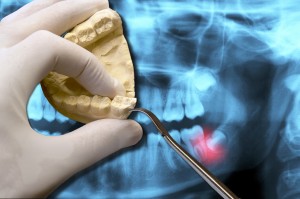All About Wisdom Teeth
 From the time you’re a baby all the way through adolescence, your teeth erupt through the gums in choreographed stages. First are the incisors, followed by the canines. Then come the first and second molars. All of these teeth appear before a child turns 3 years old.
From the time you’re a baby all the way through adolescence, your teeth erupt through the gums in choreographed stages. First are the incisors, followed by the canines. Then come the first and second molars. All of these teeth appear before a child turns 3 years old.
Wisdom teeth are different. They don’t start growing in the jaw until about age 7, usually erupting between ages 16 and 23. Dentists call them third molars, and they appear at the very back of the upper and lower jaws. Learn more about wisdom teeth and why they must often be extracted.
Why Do We Have Wisdom Teeth?
Because wisdom teeth cause problems for a majority of people, dentists speculate about why we even have them. The dominating theory is that throughout most of human history, tooth care wasn’t a priority, and diets were abrasive on teeth. Therefore, wisdom teeth served as an evolutionary benefit, replacing molars that had previously decayed or worn out.
Now that our diets are softer and oral hygiene is a priority, there are no gaps to fill when wisdom teeth begin to grow. Therefore, it’s often best to simply extract them before they damage your smile.
Why Do Wisdom Teeth Often Cause Problems?
Some people with large enough jaws have no issues when their wisdom teeth start to erupt. As long as there’s room in your mouth, you might be able to keep your third molars.
However, most people’s mouths are too small to accommodate wisdom teeth, or these molars come through in the wrong position. This can cause them to become impacted, or trapped under your gums, which may result in pain and discomfort, infections, tooth decay, and gum disease. In severe cases, cysts or tumors can form below the teeth, leading to nerve pain and bone loss in the jaw.
Most dentists prefer to remove wisdom teeth when patients are in their late teens or early 20s—the window when most people’s wisdom teeth begin to erupt. By acting within this timeframe, dentists can often prevent serious problems from occurring.
Signs You Should Have Your Wisdom Teeth Removed
Every patient is unique, which is why Dr. Evanson closely monitors the growth of wisdom teeth as patients reach their late teenage years. X-rays and oral exams tell a dentist if your wisdom teeth are causing problems. Here are the signs you may need to have your wisdom teeth extracted:
- Your wisdom teeth haven’t erupted yet, but based on X-ray images, your dentist can tell that they have become impacted and will need to be removed to prevent problems.
- Your wisdom teeth haven’t erupted yet, but your dentist can tell that they will overcrowd neighboring teeth if allowed to grow in.
- Your wisdom teeth have erupted only partially, giving bacteria a place to get under the gums and create an infection. If any pain, swelling, or jaw stiffness occurs, tell Dr. Evanson immediately.
- Your wisdom teeth have erupted, but they aren’t in the right position, so they are difficult to brush and floss. This may allow food to become trapped around your wisdom teeth and cause cavities to form.
Talk About Wisdom Teeth Options with Dr. Evanson
Before you assume your wisdom teeth must be extracted, visit Dr. Evanson for X-rays and an oral exam. Together, you and Dr. Evanson can discuss the best course of treatment for your specific situation. If you decide to keep your wisdom teeth, you will need to have them monitored regularly to make sure they aren’t causing any oral health issues.
To set an appointment at our Parker dentist office, please call us at (720) 409-0008 or contact us online. Our team can answer any questions you have about wisdom teeth and help you schedule an appointment at your earliest convenience.
Leave a reply →





